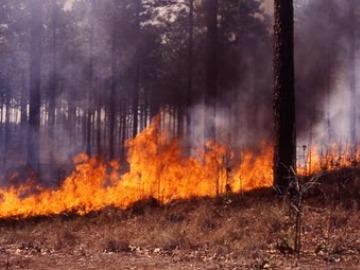
Caption
Although Georgia faces less wildfire risk than western states, population is booming in the state's "wildland-urban interfaces," where wildfire risk is greatest.

Although Georgia faces less wildfire risk than western states, population is booming in the state's "wildland-urban interfaces," where wildfire risk is greatest.
As wildfires rage in California, new research from the University of Georgia shows lower-income homeowners are at higher risk from wildfires.
They also face higher premiums and more canceled homeowners’ insurance.
In a study published in the journal Forests, UGA researchers found that counties with moderate-to-high wildfire risk are more likely to have higher poverty rates.
Many are in states dominated by a handful of insurance companies, giving homeowners few options if they need to replace a canceled policy.
Study author and dean of the School of Public and International Affairs Matthew Auer said protecting against wildfires might require government support.
"The interventions that have to be made can be very costly," Auer said. "It might cost a few thousand dollars or more to harden your home against wildfire or to hire somebody to clear vegetation, prune trees, etc."
In California, the state has stepped in to prevent insurance companies from not renewing policies in areas affected by catastrophic wildfire.
State policy incentivizes homeowners to make fire-protective upgrades and encourages insurers to come back to the market.
“The overlap of wildfire risk, poverty and concentrated insurance markets should get people thinking about policies and interventions to help the most vulnerable homeowners,” Auer said.
About of half of Georgia's population lives in areas at elevated risk for wildfire, according to Climate Central.
And although Georgia faces less wildfire risk than western states, Auer stressed that population is booming in the state's "wildland-urban interfaces," where wildfire risk is greatest.